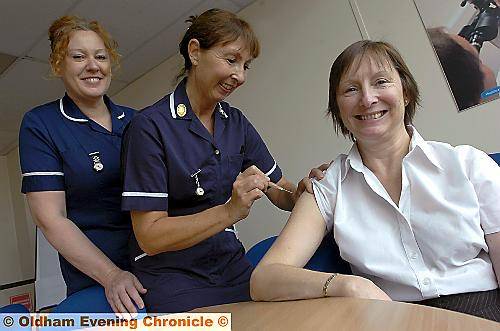Swine flu: second wave on the way
Reporter: by BEATRIZ AYALA
Date published: 30 October 2009

Photo: PHOTO BY DARREN ROBINSON
GETTING the needle . . . Oldham nurses Sandra Ward and Rhona Jones give Gail Richards her swine flu jab
NHS chiefs are urging at-risk Oldhamers to take up the offer of a swine flu jab as a second wave of the pandemic looks set to sweep in.
The first wave peaked in July with 200 sufferers a day in Oldham authorised to collect tamiflu. Case numbers fell to a low of 90 a day in August.
Since then, there has been a gradual increase across the country with cases expected to rise heading into November and the festive season.
Health bosses said residents should not panic as evidence is now pointing to a less severe but more prolonged outbreak.
Hotspot areas in the North-West have been identified as Manchester, and East and Central Lancashire.
Alan Higgins, director of public health, said: “At the moment it seems that younger people are particularly susceptible to the virus.
“People with underlying health conditions such as diabetes, heart and kidney disease, and pregnant women are more vulnerable to catching the virus and experiencing complications. The message is simple — if you can’t catch it, you can’t pass it on.”
Plans to vaccinate staff and vulnerable patients at the Royal Oldham Hospital will begin this week, while front-line NHS staff across Oldham, as well as social services workers, will begin to receive the vaccine in the next two weeks.
Gail Richards, chief executive of NHS Oldham, is in the at risk group due to a managed heart condition, and has taken up her swine flu jab.
She said: “It is great news that for the majority of the population, swine flu is proving to be milder than was originally feared.
“We are, however, concerned that the number of people needing hospital treatment and critical care continue to rise.
“I want to do all I can to make sure patients and staff are safe.”
If you think you have swine flu, call 0800 1 513 513 for information or 0800 1 513 100 for treatment.
Alternatively, visit the National Pandemic Flu Service website at www.direct.gov.uk/pandemicflu.
Symptoms
l The sudden onset of fever (body temperature of over 38 degrees) plus any two of the following:
l Cough or shortness of breath.
l Headache.
l Sore throat.
l Unusual tiredness.
l Aching muscles.
l Vomiting.
l Runny nose.
l Loss of appetite.
l Diarrhoea.
Prevention
Simple preventative measures include:
l Regular and thorough hand-washing.
l Covering the mouth and turning away from people when coughing or sneezing.
l Using paper tissues and throwing them away immediately after use.
l Washing hands after coughing or sneezing.
Most Viewed News Stories
- 1You can score free tickets to a Latics game while supporting Dr Kershaw’s Hospice
- 2Tributes paid following death of hugely respected Oldham community figure Dale Harris
- 3Primary school in Uppermill considers introducing new ‘faith-based’ entry criteria to tackle...
- 4Public inquiry announced into rail upgrade that could leave villages ‘cut off’ for months
- 5Trio arrested, drugs and weapons seized following Chadderton raid




